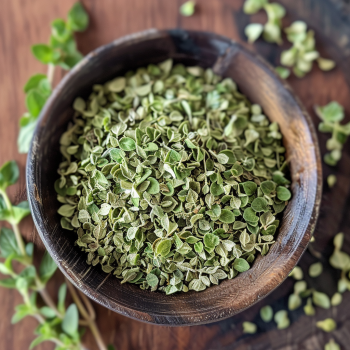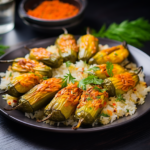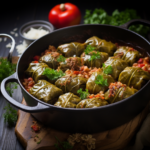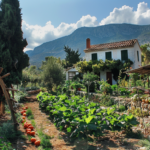Greek Oregano: Unveiling the Flavorful Essence of Mediterranean Cuisine
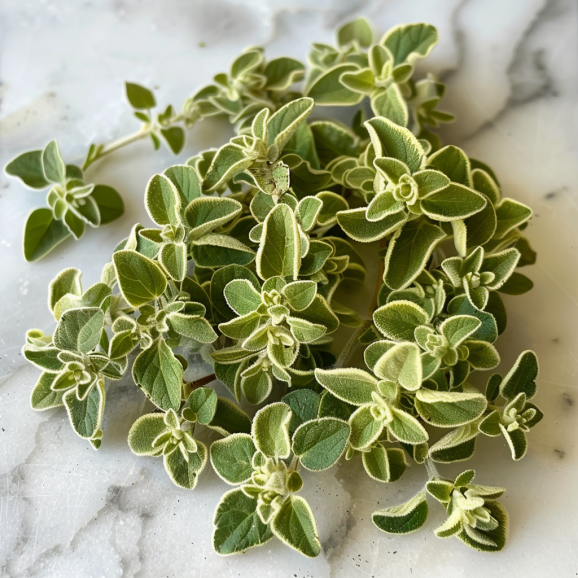
Greek oregano, renowned for its robust flavor and aromatic profile, stands as a cornerstone in Mediterranean cuisine. With its botanical name Origanum vulgare hirtum, this perennial herb is a member of the mint family, native to the Mediterranean region. Celebrated for centuries for its culinary and medicinal properties, Greek oregano holds a revered status in both traditional and contemporary cooking.
Ancient Roots and Culinary Significance
With origins tracing back to ancient Greece, oregano holds a prominent place in Greek mythology and culinary traditions. The ancient Greeks revered oregano as a symbol of joy and happiness, often using it in ceremonies and festivals. Today, it remains a staple herb in Greek cuisine, elevating dishes with its bold, peppery flavor and earthy undertones.
Versatile Uses in Greek Cuisine
In Greek cuisine, oregano finds its way into a myriad of dishes, imparting its distinctive essence to soups, stews, salads, meats, and vegetable dishes alike. From classic Greek salads adorned with fresh oregano leaves to hearty meat dishes infused with its aromatic flavor, this herb adds depth and complexity to culinary creations. It is also a key ingredient in iconic Greek dishes such as spanakopita (spinach pie) and moussaka, enhancing their savory profiles with its fragrant notes.
Medicinal Properties and Health Benefits
Beyond its culinary allure, Greek oregano boasts an array of medicinal properties that have been treasured for centuries. Rich in antioxidants, vitamins, and minerals, oregano is believed to possess antibacterial, antiviral, and anti-inflammatory properties. In traditional Greek medicine, oregano is used to aid digestion, alleviate respiratory ailments, and promote overall well-being. Additionally, oregano tea, brewed from dried leaves, is cherished for its soothing properties and is often enjoyed as a remedy for ailments such as colds and sore throats.
Culinary Enchantment and Global Appeal
The enchanting aroma and robust flavor of Greek oregano have transcended borders, captivating palates worldwide. Whether sprinkled over tomato sauces, roasted vegetables, or grilled meats, its presence in culinary creations adds depth and authenticity to dishes. As travelers embark on culinary journeys to Athens, Greece, they encounter the vibrant essence of Greek oregano infused in traditional delicacies, offering a taste of the region’s rich culinary heritage.
Growing Oregano Plants
Oregano thrives in a variety of growing conditions, making it an ideal choice for both novice and seasoned gardeners. This drought-tolerant herb prefers well-drained soil and ample sunlight, making it suitable for a range of climates and environments. Whether planted in raised beds, specialty gardens, or containers, oregano adapts effortlessly to its surroundings, adding a touch of Mediterranean charm to any space.
Culinary Delights with Oregano
In the kitchen, oregano elevates the flavor of an array of dishes, from classic Greek and Mediterranean fare to contemporary culinary creations. Whether sprinkled over freshly sliced tomatoes, infused into egg dishes, or incorporated into savory sauces, its aromatic leaves impart a distinctive aroma and flavor that enhances every bite. Whether used fresh or dried, oregano adds depth and complexity to a variety of culinary creations, making it a staple herb in any cook’s arsenal.
Caring for Oregano
Oregano requires minimal maintenance, making it an ideal choice for busy gardeners. Regular pruning encourages healthy growth and prevents the herb from becoming woody, while adequate spacing between plants promotes good air circulation and reduces the risk of pests and diseases. Additionally, drying oregano leaves for later use ensures a steady supply of this flavorful herb year-round, allowing you to enjoy its aroma and flavor long after the growing season has ended.
Easy to Grow and Drought-Tolerant
Oregano, known for its resilience and adaptability, is an easy-to-grow herb that thrives in a variety of climates. Its drought-tolerant nature makes it a perfect choice for gardeners in regions with limited water resources or hot, arid summers. Whether planted directly in the ground or in containers, oregano requires minimal care, making it an ideal addition to any garden.
Culinary and Ornamental Varieties
While culinary oregano, including Greek and Syrian varieties, is prized for its aromatic leaves and robust flavor, sweet marjoram adds a delicate, sweet note to dishes. These plant varieties also attract beneficial insects to the garden, making them valuable additions to any edible landscape. Additionally, ornamental oreganos, such as black beauty and runner bean, offer striking foliage and vibrant blooms, making them a favorite among gardeners and landscapers alike.
Planting and Care Tips
When planting oregano, ensure adequate spacing between plants to promote good air circulation and prevent overcrowding. This helps reduce the risk of pests and diseases, ensuring healthy growth throughout the growing season. Oregano’s dark green leaves can be harvested regularly for culinary use or dried for later use, providing a steady supply of flavor year-round. Whether grown in raised beds, herb gardens, or containers, oregano thrives in well-drained soil and full sunlight, making it a versatile and low-maintenance addition to any garden.
Italian Oregano Vs. Greek Oregano
Greek oregano and Italian oregano are both varieties of Origanum vulgare, but they exhibit slight differences in flavor and aroma. While Greek oregano, particularly the Vulgare hirtum variety, is renowned for its robust and pungent flavor with hints of pepper and lemon, Italian oregano tends to have a milder taste and a sweeter aroma. Despite these distinctions, both varieties are versatile and widely used in Mediterranean cuisine, adding depth and complexity to dishes. Additionally, Italian oregano shares the same characteristic of being easy to grow, thriving in well-drained soil and full sunlight, making it a favorite choice for home herb gardens and specialty gardens alike.
When it comes to culinary applications, Italian oregano is often preferred in dishes where a subtler oregano flavor is desired, such as tomato sauces and pizza toppings. Its delicate taste pairs well with a wide range of ingredients, enhancing the overall flavor profile without overpowering other herbs and spices. With its ease of cultivation and adaptable nature, Italian oregano is a staple herb in many kitchens, offering home cooks and professional chefs alike a convenient and flavorful option for adding depth to their favorite recipes.
In Conclusion
Greek oregano, with its rich history and versatile applications, epitomizes the essence of Mediterranean cuisine. As a cornerstone of Greek culinary traditions, it weaves its aromatic charm into an array of dishes, from traditional favorites to contemporary creations. Whether used to elevate the flavor of classic tomato sauces or to infuse depth into hearty meat dishes, Greek oregano adds a distinctive touch to every culinary endeavor.
Moreover, the appeal of Greek oregano extends beyond the kitchen, as it boasts a plethora of medicinal properties and health benefits. From aiding digestion to soothing ailments, this herb holds a revered status in both culinary and medicinal realms. Brewing a cup of rosemary tea or incorporating oregano leaves into savory dishes not only tantalizes the taste buds but also nourishes the body and soul.
For those seeking to embrace the allure of Greek oregano, cultivating this herb is a rewarding endeavor. With its easy-growing nature and adaptability to various climates, oregano plants flourish in herb gardens and kitchen windowsills alike. From the peak of its growing season to its fragrant blooms, Greek oregano invites enthusiasts to embark on a journey of culinary and botanical delight.
As travelers wander through Athens food markets or tend to their own herb gardens, the allure of Greek oregano beckons. Whether adorning a cherry tomato salad or infusing heat into hot peppers, its presence adds a touch of authenticity to every culinary creation. Embrace the charm of Greek oregano and savor the essence of the Mediterranean, one flavorful dish at a time.
Celebrity Chefs on Chef on a Bike YouTube
Greek TV Chef Anna-Maria Barouh
Facebook: Anna-Maria Barouh
Instagram: annamariabarouh
- Celebrity Chef, Food Stylist, Recipe Developer Anna Maria Barouh is our guest on Chef on a Bike. Anna-Maria is a regular on Greek Television and has a very popular food blog and is a magazine contributor.
- YouTube Episode: Chef on a Bike YouTube Episode






